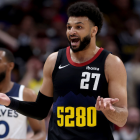With the huge jumps the salary cap this summer and next summer, star players have tried to remain flexible with their potential earnings by signing shorter deals and then taking advantage of earning max percentages of an ever increasing cap. LeBron James has done it with the Cleveland Cavaliers ever since he returned from Miami. Kevin Durant just signed a one-and-one deal with the Golden State Warriors that will allow him the flexibility, in theory, to earn more money over the next couple years instead of just locking in with a four-year deal this summer.
This has basically become a loophole for superstar players to earn a bit more than they would with long-term max contracts. NBA commissioner Adam Silver doesn't seem to like this trend of keeping options flexible in this way. He, likely prompted by the owners he works for, would like to see stars stick with teams long-term, which is what the Collective Bargaining Agreement was designed to accomplish. That doesn't always work out and now Silver wants to do something about maybe curbing the one-and-one deals for something that becomes more long-term for incumbent teams. Via Cleveland.com:
"One of the unintended consequences (of doing contracts like James) I feel on behalf of the players is the fact that they end up putting themselves in this position where they're taking enormous financial risk," NBA commissioner Adam Silver told cleveland.com. "The system is designed for guys to enter into long term contracts, so, and you can only get so much insurance. So one of the unintended consequences is they take risk beyond what we would like to see them take.
"The other thing is, the system is designed and incentivizes players to stay with the same teams," Silver said. "At the same time I respect free agency so if they make those decisions to leave, that's fine too. But as I said, I'd like to talk to the union about maybe modifying the system so there's a little bit more of an incentive to stay with your existing team."

The one-and-one contract gives flexibility and earning power to the star players. By signing on for one year and controlling your destiny with a player option in the second year, you're keeping every door open. Silver's critique that it's a risk to these players financially doesn't really hold too much water because guys like LeBron James or Kevin Durant could blow out their ACL tomorrow and they'd still end up with a max offer from many teams next summer. It's not a risk for the truly great players who do this.
The way for the owners and union to possibly get around this is by having a designated option for one spot on the roster in which they can pay a star player above the max contract limits. That way, you can truly incentivize a superstar to stick around with his incumbent team and not leave for greener pastures. But then, you still may run into situations like the Thunder where you have two superstars. What if they had that option for Durant but couldn't use it on Russell Westbrook? Does that affect how they keep the duo together in the future?
Part of the problem is something happened (Durant going to Golden State) that many owners, and especially smaller market owners, don't like. And the usual reaction to that is to redesign the system to fix a random occurrence as if it's a regular problem. In reality, most teams have about eight or nine years of employment for a superstar they draft. If they can't figure out a way to keep them around during that time, is that a problem of the league's system?






















